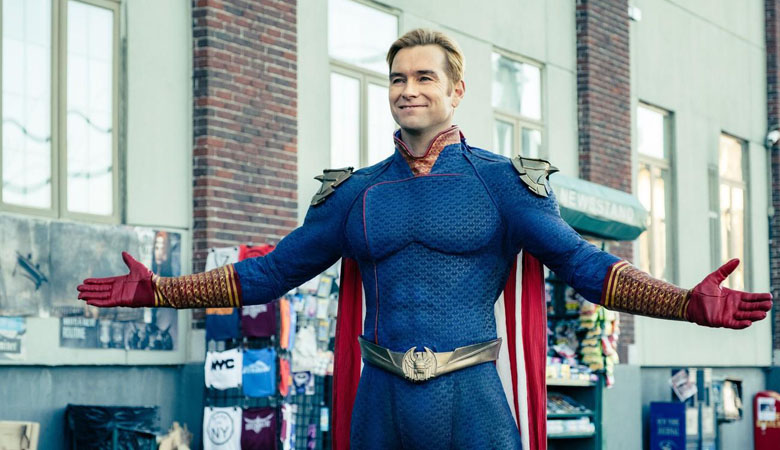It isn’t a stretch to say that Marvel has pretty much revolutionized the superhero movie and the concept of a film franchise, for better or worse. I, for one, enjoy it: is it ‘high’ art that throws into question the fragile existence of Man and the existential crisis we all share? Probably not: there’s a lot more laser beams going pew-pew than there are deep questions about the state of reality, but that doesn’t make it bad, IMHO.
But while the big-name superhero franchises like Marvel have pretty much upped the standards of what a superhero movie/media franchise ought to look like, they’ve also inundated us with so many of these movies that it does run the risk of becoming stale. The mainstream Marvel Cinematic Universe alone contains 23 films, with 14 more planned out over the next decade. This doesn’t include the eleven TV shows that are out on Disney+.
So how does a non-Marvel comic book adaptation differentiate itself from the Marvel behemoth? In a stroke of genius, the writers of Amazon went for one of the most violent, viciously dark, yet strangely humorous comic book series The Boys.
If you haven’t seen this award-worthy show, here’s a very quick rundown: The Boys centers on a ragtag group of CIA-empowered vigilantes who are tasked with monitoring and keeping in line the increasingly violent, egotistical, and corrupt superheroes of the world, particularly the prestigious “The Seven”.

The premise alone is already a huge departure from the usual, big studio concept of superheroes: instead of seeing caped crusaders as these saintly, heroic, Jesus-type figures who won’t hesitate to sacrifice their very lives to protect the world, The Boys reimagines (or, perhaps, imagines them as they would be) them as being consumed by ego, glamour, and celebrity status, with “The Seven” (the shows analog to DC’s Justice League) being the most violent, power-hungry, and abusive of the lot, severely blurring the lines between hero and villain.
And here is where Garth Ennis and the show’s writers showcase their genius: instead of competing with Marvel and Disney’s powerhouse lineup of superheroes, they instead amplified the most human flaws of the heroes and made them succumb to the allure of power. Of all the heroes and villains in the show, Homelander, leader of the Seven and secretly the most villainous of them all, is the most fascinating study on a human psyche twister by neglect, pettiness, selfishness, and of course, superpowers.
Creating Homelander
Much like the other characters from Garth Ennis’ works, Homelander is portrayed as a sexually deviant, hyper-violent, and super-powered individual bent on getting whatever petty wants he has at the moment. More than just an antithesis to DC’s Superman and the entire superhero archetype, Homelander is a dark and complex reflection of the evil inherent in humanity.
While Homelander does indulge (or, in many cases, overindulges) in villainous and evil acts like casually killing scores of people or admitting to various counts of sexual assault, at no point does he descend into cartoonish, evil-for-the-sake-of-it-villainy. Throughout the 2 seasons of The Boys, Homelander is portrayed as having a demented and perverted obsession with his (now former) boss Madelyn Stillwell, the powerful executive in charge of keeping The Seven a profitable asset to the Vought Company. In fact, a lot of Homelander’s seemingly evil acts seem to be fueled by his innate need to make Madelyn proud.

But to take it a step deeper, Homelander’s obsession with Stillwell is less an egotistical ‘look at me’ mindset, but rather, a desire to be nurtured and mothered, two things Homelander didn’t receive when he was being raised by company scientists. This fact, however, is no secret to Madelyn, who uses it to manipulate the most powerful superhero of their world to her bidding (which, for the most part, is in line with Vought company policies).
Homelander: No Sympathy for the Devil
And while it’s easy to create villains that, eventually, audience members can sympathize with (even Universe-killing Thanos could be excused as simply wanting ‘balance’), Homelander is so nuanced and multi-faceted that even if someone does find his humanity, it’s difficult to the point of dissonance to actually sympathize with his character. Counterintuitively, by showcasing the very human and very real flaws of Homelander, the writers were able to keep the purity of his evil without diluting it with a completely sympathetic human background.
Masterfully portrayed by Anthony Starr, Homelander is one of the prime examples of what it is to be a villain, and Garth Ennis’ characterization of Homelander is a masterclass in superhero writing, something that perhaps Marvel can take a page or two from.





